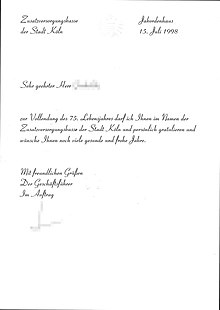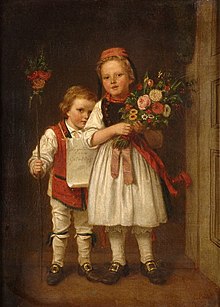Birthday
![]()
This article is about the biographical date. See also: The birthday or surreal number.
Birthday (raised: cradle festival) is the day of birth and the anniversary of the birth of a person. The anniversaries are named with the number of years since birth, so on the 1st birthday a child is 1 year old.
A common custom is to celebrate one's birthday with friends and relatives. For children, in addition to celebrating with relatives, children's birthday parties are common. In many countries, it is also common to give gifts to the person. Likewise, there is also the custom of a person giving gifts to others on their birthday. Another very common birthday custom is to decorate a birthday cake or cake with the exact number of candles corresponding to the birthday.
It is customary to wish a person a happy birthday or to sing a birthday song. In many parts of the world, the English song Happy Birthday is common. If it is not possible to congratulate in person, it is common as a gesture of attention to send a birthday greeting by mail, phone call, email or text message. While in Germany it is said to be bad luck to congratulate before the birthday, in some regions of Austria it is customary to congratulate and celebrate the evening before.
Special birthdays are the coming of age or round birthdays (e.g. 30th, 50th, 75th, ...), for which there may be further, special regional customs. These include, for example, the box wreath or sock wreath on the 25th birthday or the sweeping of the cathedral stairs on the 30th birthday.
The term birthday is also used in a figurative sense for (founding) anniversary (of a company, an institution, a building, etc.), e.g. "port birthday"; the founding, establishment or opening is in this case understood as "birth".

Letter of congratulations from an employer on the 75th birthday of a former employee, 1998

Birthday cake with 28 candles and the writing Happy Birthday

Carl Johann Lasch: Congratulations on your birthday (children deliver a birthday card and flowers, 19th century)
Origin
Cultural-historical modern custom of birthday celebration goes back to the early advanced civilization of ancient Egypt, as well as the culture of antiquity (Greeks and Romans). Among the Egyptians, the birthday celebration was held in honor of the king (pharaoh), son of the sky deities. Among the Greeks and Romans, on the other hand, the birthday celebration was used to invoke guardian spirits to protect the person being celebrated from bad things. Birthday gifts represented an offering to the guardian spirit. Ancestral remembrance also played a role. Originally, monthly celebrations, usually of communities of people born on the same day, were common. A reference to gods supposedly born on the same day was the unifying factor. Invitations, blessings, gifts, speeches and poems were common.
According to Herodotus (5th century BC), of all the days in the year, the birthday is the one that Persians celebrate the most. It is customary, he says, to furnish the table on this day with stronger provisions than usual: The richer people eat fully baked cow, horse, camel or donkey, while the poorer classes use smaller cattle instead.
In Roman imperial times, the birthday of the ruler as well as the members of his family was solemnly celebrated with thanksgiving feasts. Not least because of its importance in astrology, the birthday and special events occurring on it could be connected with numerous mystical-magical ideas about their foreshadowing for the fate of the person concerned with corresponding apotropaic ('averting') customs or rituals. The birthday custom was integrated into the pagan-Christian ecclesiastical 'Solemnity of the Nativity of the Lord' (Latin Sollemnitas in nativitate Domini, "Christmas").
Until the international contemporary culture has preserved and developed various birthday customs (symbolic birthday gifts, birthday candles, birthday cake, etc.). In the Christian Middle Ages, ordinary people then celebrated the day of their saint (the saint after whom they were named), but among the nobility they celebrated the anniversary of the birth. The Squire's Tale, one of Chaucer's Canterbury Tales, begins with King Cambuskan proclaiming a feast to celebrate his birthday.
Judaism was and is hostile to the pagan birthday cultures.
In Christianity
The Christian Bible explicitly mentions birthday celebrations in only three places, one of them in the 2nd Book of the Maccabees, which belongs to the late writings of the Old Testament, each time celebrated by rulers hostile to God:
- the birthday of Pharaoh, on which he pardons the cupbearer and hangs the baker (Gen 40:20 EU),
- the birthday of Antiochos IV Epiphanes, when the Jews were driven to the sacrificial feast by brute force (2 Macc 6:7 EU),
- the birthday of Herod Antipas, which led to the beheading of John the Baptist (Mt 14:6 EU as well as Mk 6:21 EU).
According to some Christian interpreters, there is also a positive mention of birthday celebrations in the Bible:
- the "days" of the sons of Job, according to which Job-who was not a Jew-sacrifices his sons each time for their sanctification, in case they have sinned during the feast arranged (Job 1:4-5 EU).
In nascent Christianity, Christ's birthday was celebrated early on. It is known today as Christmas. In the African, Egyptian, and ancient Palestinian churches, the birth of Christ was celebrated differently in the 3rd and 4th centuries, in January, April, or May. Clement of Alexandria, Augustine, and Gregory of Nazianzus report different dates. From Cyprus, Armenia, and Mesopotamia in the 4th century, January 6 is attested as the ecclesiastical feast of Christ's birthday. The Armenian Church keeps the feast date of January 6 to this day.
In the Christian world, birthday celebrations then gradually appeared from the 4th/5th century onwards, initially for emperors, some of whom were deified (divus), and for persons of the Christian cult such as Mary and John the Baptist. More important for cultic practice, due to the tradition of venerating witnesses to the faith who were ready to die, the so-called martyrs, was the day of death, which - interpreted as entry into true, eternal life - was often called the birthday (dies natalis). Until the 19th century, private birthday celebrations remained isolated and were encountered at best in higher social classes. The celebration of the birthday spread at first rather in Protestant areas, while in the Catholic area the name day was celebrated preferentially. Only in more recent times has the celebration of the birthday also become established among Catholics.
The feast of Christmas can be seen as a birthday celebration: According to the tradition of many Christian churches, the 'Solemnity of the Nativity of the Lord' is celebrated on December 25 or January 6. In addition, the 'birthday of the church' is traditionally celebrated in various Christian churches on Pentecost.
The Christian religious community of Jehovah's Witnesses, citing the practice of early Christians, rejects the celebration of birthdays, including Christmas, in any form.
Search within the encyclopedia